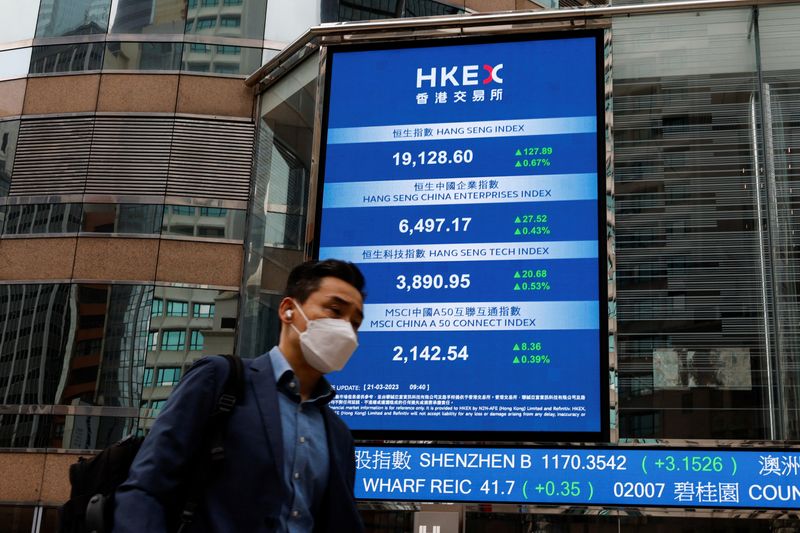Tech drags Hong Kong stocks, dollar squeezed as US inflation slows
2023.04.12 23:03

© Reuters. FILE PHOTO: A man walks past a screen displaying the Hang Seng Index at Central district, in Hong Kong, China March 21, 2023. REUTERS/Tyrone Siu
By Tom Westbrook
SINGAPORE (Reuters) – Asian stocks struggled on Thursday, dragged by selling in Hong Kong tech shares, while the dollar was under pressure and short-dated bonds were firm as softening U.S. inflation seemed to suggest the U.S. rate hike cycle was nearing its end.
Early in the Asia day the euro hit a 2-1/2 month top at $1.10. Investors reckon Europe’s central bankers will need to stay on the hawkish side for longer than their U.S. counterparts to rein in rising prices.
MSCI’s broadest index of Asia-Pacific shares outside Japan slid 0.3%, largely pressured by a 1.5% drop in Hong Kong tech stocks in the wake of the Financial Times reporting SoftBank was selling down its Alibaba (NYSE:) stake.
Alibaba shares were down 3% in early trade and SoftBank shares flat and neither immediately responded to Reuters enquiries.
Overnight data showed U.S. consumer prices barely rose in March. The annual 5% headline rise was the smallest since May 2021 and down from 9.1% last June. Core CPI, which strips out energy and food prices, remained sticky at an annual 5.6%.
Minutes from the Federal Reserve’s March meeting also showed some policymakers considered pausing hikes, before agreeing to last month’s 25 basis point rise, with concerns centering on whether bank wobbles would cause a broader tightening in credit.
“Some hit is expected, with banks tightening their lending standards,” said currency analyst Moh Siong Sim at the Bank of Singapore.
“But the jury is still out on whether it still has a meaningful impact on U.S. growth. That part of the equation is still being worked out. It could slow down further dollar weakness.”
The is near a two-month low at 101.47. The dollar fell 0.4% to 133.19 yen overnight and dropped about 0.5% to $0.6694 per . The Aussie caught an additional boost from a bigger-than-expected jump in hiring in March, reaching $0.6710 by mid-morning. [AUD/]
Two-year Treasury yields dropped more than 8 bps and were then steady in Asia trade at 3.9662%. Fed funds futures imply about a 70% chance that there’s one more rate hike coming in May, followed by cuts nearer the end of the year.
‘IF’
Ahead on Thursday are Chinese trade figures, that might go to the strength of what is investors’ greatest hope for growth in 2023, which is China’s post-pandemic recovery.
British monthly GDP is also due, as are U.S. producer prices. However, given the Fed’s concern about banks much of the week’s focus will fall on earnings at Citi, Wells Fargo (NYSE:) and JP Morgan Chase (NYSE:) due on Friday.
“It is an ‘if’ monetary policy world, that is, wait and see about banking and financial conditions,” said Sam Rines, managing director at research firm CORBŪ in Texas. “Banking sector issues are explicitly part of the reaction function now.”
Goldman Sachs (NYSE:) sounded upbeat in research published overnight, noting risks of an outright banking crisis have declined sharply since no further banks have blown up since the weekend of the collapse of Silicon Valley Bank a month ago.
Still, there is pressure and warning signs, particularly for regional lenders, with Rines pointing to the Bank of South Carolina which noted “precipitous increases” in deposit costs and thin margins in its first-quarter earnings this week.
Elsewhere oil prices held sharp gains made in the wake of the inflation data, with futures steady at $87.22 a barrel. Gold held at $2.018 an ounce.
Shares of embattled Chinese property developer Sunac China resumed trade after a more than year-long suspension in Hong Kong, with the company in the midst of a debt restructure. The stock was last down 45%.








